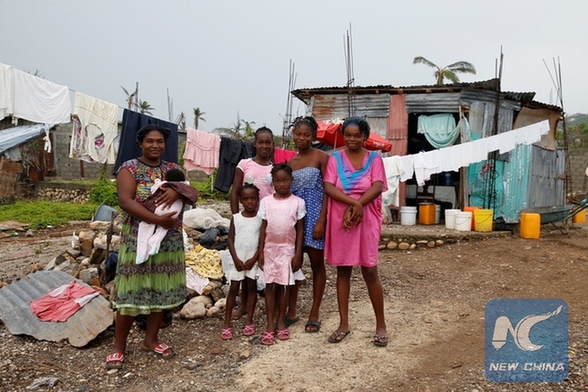Tragedy of poverty continues to ravage Haiti
- By Earl Bousquet
 0 Comment(s)
0 Comment(s) Print
Print E-mail China.org.cn, May 3, 2017
E-mail China.org.cn, May 3, 2017
|
|
|
Marie Lestin (L), 34, poses for a photo next to her children in front of their new house after Hurricane Matthew hit Jeremie, Haiti, October 20, 2016.[Xinhua file photo] |
James McCament, acting director of the U.S. Citizenship and Immigration Service, in a letter to U.S. Homeland Security Secretary James Kelly, concluded that conditions in Haiti have improved enough to end the “temporary protection status” specially afforded to tens of thousands of Haitians fleeing poverty and devastation.
At the same time, United Nations (UN) peacekeeping troops long based on Haiti are also being withdrawn (as of September 2017) based on claims the security situation has improved.
The two events may seem unrelated. However, put together, they add to the grief and anxiety affecting millions in what remains the poorest nation in the Western Hemisphere.
Hundreds of thousands of Haitians fear that if the UN does indeed pull its troops out without addressing their just demands for compensation and justice, it may just walk away scot-free from responsibility for two incidents that took too many lives to be officially excused.
The recommended deportations from the U.S. will also only add to the complexity of the situation facing the Haitian government and the nation's impoverished majority.
Poverty has dogged Haiti for over two centuries. As if that wasn't enough, it has also had an unfair share of costly natural and man-made disasters lately.
In 2004, Hurricane Jeanne killed 3,000 people; and in 2016 Hurricane Matthew took over 1,000 lives, destroyed 20,000 houses and displaced over 1.4 million people. Even worse was the catastrophic January 10, 2010 earthquake (7.3 magnitude) that took over 220,000 lives, injured 300,000 and left 1.5 million poor Haitians homeless.
A health crisis of catastrophic proportions also hit Haiti in 2010, after UN peacekeepers dumped cholera-infected sewage into a river, resulting in 9,300 deaths and over 800,000 people affected.
Today, the UN stands twice accused in Haiti: facing demands for legal recourse from families of the cholera victims, as well as victims of later alleged sex crimes by peacekeepers.
Successive holders of the post of Secretary General have fought hard to shirk organizational responsibility and save the world body facing court claims for compensation.
Peacekeepers are shielded from legal claims by UN protocols of immunity from prosecution. This policy was applied to Haiti under former Secretary General Ban Ki Moon and continued under his successor Antonio Gutteres.
The UN concedes awareness of the problems caused by its troops, but simply refuses to allow its staff to cooperate with investigators.
The $346 million UN Haiti mission (MINUSTAH) is one of the longest-running in the world, but the Security Council voted unanimously on April 13 to end its 13-year stay. Haitians thus continue to feel abandoned today, with the world's attention largely focused everywhere else.
However, while accusing the nations than can most help of abandoning their cause, the Haitian authorities have a totally different attitude to China's assistance during its eight years as part of the multinational force.
Haiti does not have diplomatic ties with China. Yet, a Chinese aircraft was the first to land with humanitarian assistance after the massive 2010 earthquake, the first of five delivering an initial two-month US$5 million emergency relief aid package.
Beijing further provided financial cooperation and developmental assistance through: new buildings for the devastated ministry of finance, customs bureau and tax office; construction of new roads, highways and special cable car system; rebuilding the international airport and ongoing support in energy and agriculture.
As part of the UN mission from 2004 to 2012, Chinese troops were also officially praised by the international body for sharing their rapid-response expertise, gained from China's own experiences with earthquakes in the southwest province of Sichuan.
China has also continued to appeal at the UN Security Council for member-countries to give more direct aid and assistance to Haiti. Following Hurricane Matthew in October 2016, the China delegation called for member-states to not only help Haiti get back on its feet, but also to help it do more on its own.
Haiti's cholera victims and others seeking justice, as well as those now being lined-up for deportation from the U.S., continue to pray that official UN diplomatic immunity will eventually be revoked sooner than later, so that their pleas for justice can be heard.
And Haiti's historical tragedy continues to unfold, its new government is also naturally hoping the American immigration officials will be dissuaded from deporting 50,000 refugees back to the poverty and misery from which they thought they had been rescued.
Earl Bousquet is a contributor to china.org.cn, editor-at-large of The Diplomatic Courier and author of an online regional newspaper column entitled Chronicles of a Chronic Caribbean Chronicler.
For more information please visit: http://china.org.cn/opinion/earlbousquet.htm
Opinion articles reflect the views of their authors, not necessarily those of China.org.cn.






